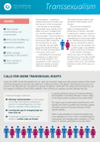America’s largest LGBT group has told a major health institution to denounce an independent scientific report written by two of its academics, or face being penalised.
The Human Rights Campaign (HRC) is objecting to a study in August by Dr Lawrence Mayer and Dr Paul McHugh which concluded that there was little evidence that supported the ‘born that way’ theory on sexual orientation.
The academics work at Johns Hopkins University, which has been told that if it does not distance itself from the study, it will face “consequences”.
’Born that way’
HRC are threatening to lower Johns Hopkins’ Health Equality Index rating, which judges how ‘LGBT-friendly’ a hospital or medical institution is.
The study said that: “Some of the most widely held views about sexual orientation, such as the ‘born that way’ hypothesis, simply are not supported by science.”
It also explained that transsexualism was an “elusive concept” that could also not simply be explained with the ‘born that way’ theory.
HRC called the study a “misguided, misinformed attack on LGBT communities”.
Beyond debate
While acknowledging the complexities of transsexualism, they said, “the evidence that we are born with a given gender seems well supported by direct observation”, and that “males overwhelmingly identify as men and females as women”.
It continued: “The fact that children are (with a few exceptions of intersex individuals) born either biologically male or female is beyond debate.”
Johns Hopkins Medicine has responded to the calls in a statement, saying that they are committed to providing a “welcoming and supportive environment – and the best possible care – for all LGBT individuals”.
’Freedom of expression’
However, it has defended its employees’ free speech, declaring its continued commitment to providing its staff with “academic integrity and freedom of expression”.
It also stated that, “as an academic medical research institution, academic freedom is among our fundamental principles”.
Kim Hoppe, a spokeswoman for Johns Hopkins, said the university “will not penalise faculty for statements made in public debate”, even if a faculty member “is expressing views that provoke controversy and others may consider wrong”.


